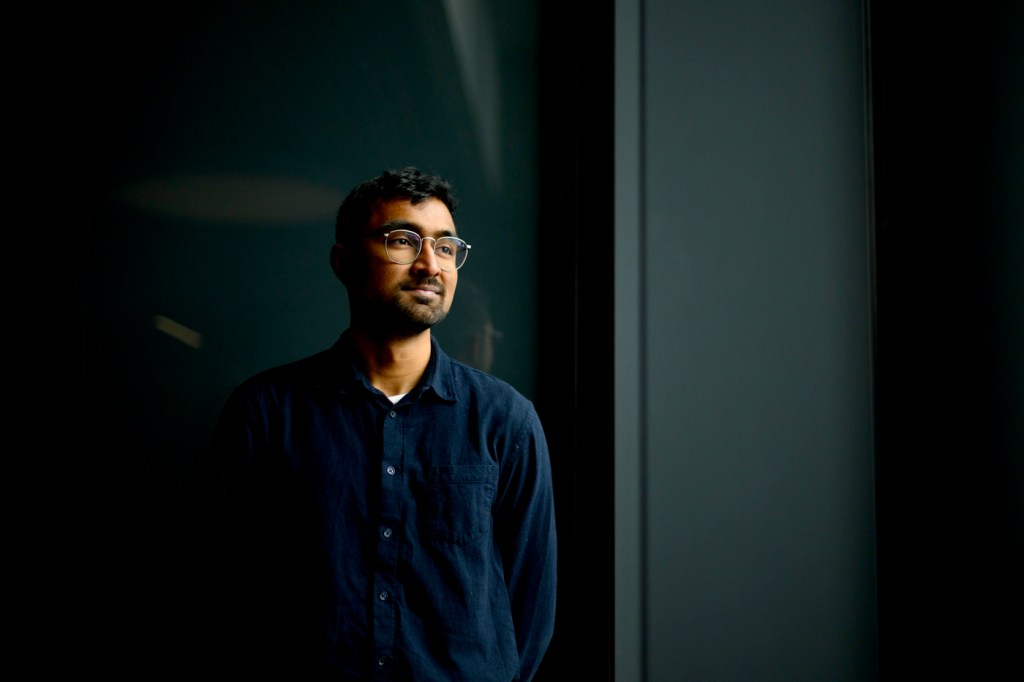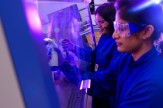Northeastern graduate seizes opportunity to be involved in cutting-edge maternity health research
2024 George Mitchell Scholar Vivek Kanpa is thriving at University College Dublin, continuing his dream career and education.

When Vivek Kanpa is not in class, the 2023 Northeastern graduate is involved in cutting-edge maternity health research at the AI_PREMie lab at University College Dublin in Ireland.
The lab has been developing a new non-invasive blood-based diagnostics platform that uses machine learning and AI to distinguish the risk of pregnant women getting preeclampsia.
“It’s been a really great opportunity for me to creatively explore different techniques in machine learning and AI,” says Kanpa, who is an awardee of the 2024 George J. Mitchell Scholarship, and has been pursuing for the last eight months a fully-funded master’s degree in artificial intelligence for medicine and medical research at University College Dublin — a partner of Northeastern’s in health care research.
The AI_PREMie lab at UCD is run by Patricia Maguire, director of UCD Institute for Discovery and professor of biochemistry. Kanpa connected with Maguire through Northeastern’s research partnership with UCD.
Preeclampsia is a serious pregnancy complication characterized by high blood pressure that affects one in every 10 pregnant women and claims the lives of 50,000 mothers and 500,000 babies every year.
Editor’s Picks
Maguire’s risk stratification tool for preeclampsia, AI_PREMie, will be able to assist clinicians in determining a more accurate diagnosis, predict how a patient’s preeclampsia will progress and help making decisions in real-time. Powerful machine-learning algorithms of the tool utilize biochemical information transmitted by molecules in the blood and previously collected clinical data.
To figure out how to predict a patient’s preeclampsia and its progression, Kanpa and his colleagues have been looking at different analysis methods. He even has been consulting with doctoral students of Raimond Winslow, a leader in computational medicine and director of Life Science and Medical Research on Northeastern’s campus in Portland, Maine.
“There’s a huge overlapping interest with us relating to maternal health and pregnancy disorders,” Kanpa says. “It’s been really cool getting to work with such experienced biologists and computer scientists.”
The team is trying dozens of different machine learning and optimization techniques, different types of models and algorithms, he says, to figure out the least biased and the most efficient in terms of accuracy approaches.
“One big bias is with a potential lack of patient diversity,” Kanpa says. “You don’t want one narrow bandwidth of blood pressure, for example, because then you don’t know how a woman with high or low blood pressure might respond.”
The model needs to be trained well on data that the scientists have, Kanpa says, to the point where it can’t make generalized predictions about new patients coming in.
“Our machine learning model has been outperforming some of the goals that I even had set out to,” Kanpa says.
Before coming to UCD, Kanpa had an idea of creating a tool that would match a cancer patient to a specific treatment most beneficial for them based on high-quality datasets that had been acquired through cancer research. He says it has been valuable for him to work with Maguire and her colleagues.
“I wanted to use this year to focus more on the less accessible things in America, the experiential opportunities, which I guess is something that I developed the sense for at Northeastern,” Kanpa says.
AI and its applications in medicine is a very new field, he says. He is one of the youngest students in the UCD program. However, Northeastern’s coursework, he says, prepared him very well for the work. At Northeastern, Kanpa had experience both in biology and data science.
“I really see the benefit to having that interdisciplinary background,” Kanpa says.
UCD gives a lot of flexibility to Mitchell Scholars, he says, which allowed him to craft his own experience.
Kanpa has also begun an internship with Novartis on their AI and computational sciences team doing the electrocardiogram signal and heart disease-related research.
The Mitchell Scholarship provided him with the opportunities to meet physicians leading wings of hospitals, Kanpa says, research scientists from big biopharma companies, former Taoiseach, or Irish prime minister, Bertie Ahern, one of the directors of Google UK/Ireland and Senator George Mitchell himself.
“It has been an unbelievable experience, both for reasons I predicted I would enjoy it, but also for all the unexpected people I have been able to meet and opportunities I’ve had here,” he says.
Coming into 2024, Kanpa says, he knew that he would want to apply to doctoral programs after graduating from the UCD in August. In the beginning of March he committed to the Icahn School of Medicine at Mount Sinai’s doctoral program in artificial intelligence and emerging technologies in medicine.











